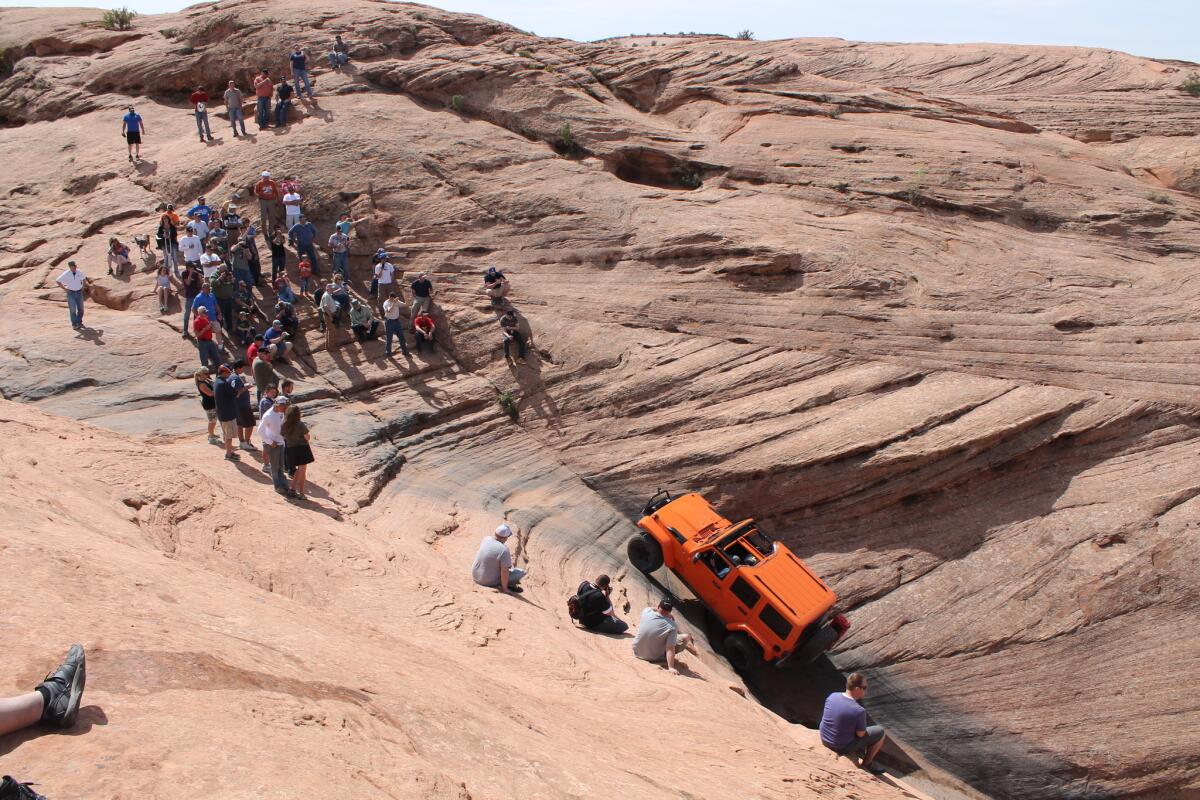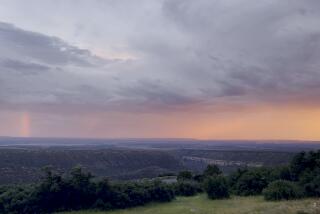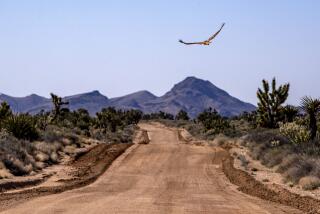Easter Jeep Safari draws drivers eager for off-road action

- Share via
MOAB, Utah — The big-wheeled Jeeps crowded the lot outside Eddie McStiff’s Restaurant and lined up three deep at Walker’s 76 Station. They even took over all four spaces at the electric vehicle charging station in the Best Western parking lot.
Springtime means this small Utah town is hosting thousands of 4-by-4s eager for off-road action. Jeeps ranging from the bone-stock to the too-gnarly-for-public-streets have come here for the 48th annual nine-day festival known as Easter Jeep Safari.
The event, one of the largest gatherings of off-road fans in the world, draws enthusiasts dying to drive some of the most challenging and picturesque trails in the U.S.
PHOTOS: Highlights from the 2014 Easter Jeep Safari
Joining them each year are some of the biggest brands in the four-wheeling industry — none more so than Jeep itself.
“It’s the Super Bowl of off-roading,” said Jim Morrison, director of Jeep’s marketing.
Though the brand had no hand in creating the event, and it doesn’t sponsor or facilitate it, Jeep uses the Safari to connect with customers and learn what they want from future vehicles.
“It’s become a home away from home for the Jeep brand,” Morrison said. “If the customers out in Moab say they like it, we generally try to make it happen.”
Jeep doesn’t just bring prototypes to gauge the reaction of attendees. It actually takes them out on Moab’s gnarly trails and beats on them.
“We had better, because our customers are going to even if we don’t,” said Jim Repp, vehicle development manager for Jeep’s popular Wrangler brand.
Demonstrating, Repp then maneuvered a four-door Wrangler Unlimited with lifted suspension and 35-inch tires up Potato Salad Hill, one of Moab’s most feared and treacherous rock inclines — to the cheers of a crowd that was equal parts T-shirts, goatees, beer and good humor.
The Easter Jeep Safari got its start in 1967 when the Moab Chamber of Commerce was looking to draw more visitors.
“It hit everybody’s soft spot and grew from there,” said Rex Holman, treasurer for the Red Rock 4-Wheelers. His volunteer-based, for-profit club took over the event in the early 1980s after the Bureau of Land Management started requiring permits and insurance for the event.
The Safari attracts more than 10,000 participants and hundreds of volunteers a year, who come to explore the 38 trails approved by the Bureau of Land Management for off-road driving.
The rocky sandstone trails have names like Hell’s Revenge, Cliffhanger and Metal Masher. Warnings for the more extreme runs are blunt.
“Vehicle damage is likely. Equipment or mechanical damage is probable. Frequent use of your winch may be required. Roll over is common,” a Safari website says of some of the more intense options.
No one has died or been seriously injured at a Safari event, organizers say. But the threat of vehicle damage hangs in the air.
Safari participant Nathan Grizzoffi rolled his 2007 Jeep Wrangler while trying to cross a wide split in the sandstone, an obstacle known as the Golden Crack — after watching his buddy maneuver it successfully.
“As soon as it started to go, I just felt it roll the wrong way and slowly laid it on its side,” Grizzoffi said.
Like most crashes at the Safari, Grizzoffi’s Jeep was moving too slowly to do any serious damage. He wound up with a crushed side-view mirror, a minor dent in the door, and a bungled wheel fender, after his buddy winched him out of the Crack and the group continued on its way.
Holman said such accidents are actually uncommon — with fewer than 10 rollovers per each year’s thousands of vehicles.
“Keep in mind we have an audience of people who are not afraid to damage their vehicles,” he said. “When the dust settles, everybody runs over and helps them get back right side up again and they say, ‘Well that was fun,’ and head back out onto the trail.”
Though some may expect the stereotypical 4-by-4 owner to be a sunburned male with more yee-haw bravado than common sense, many Jeeps roll by with the entire family aboard, some with car seats inside and coolers latched to the rear-mounted spare tires. Most drivers approached the trails and obstacles with appropriate caution.
Many rigs have been modified in some way, often with ornate, hand-welded bumpers with built-in tow winches, or lifted suspensions, or beefy tires, some as big as 40 inches in diameter.
“Forties are the new 35s,” one rubber-savvy owner was overheard saying to a friend.
These are the kinds of trends Jeep — and its Mopar aftermarket arm — comes here to monitor.
“When we go out to Moab we’re always looking at what everybody’s doing, what starts the conversations,” Morrison said.
Jeep isn’t alone. Dozens of other aftermarket companies flock to Moab each spring to test and prove their own gear — and chase new customers.
“It’s one of our mainstay events,” said Brendan Anderson, vice president of marketing for Warn Industries, an Oregon company that has been attending the Safari for 25 years and that dominates the truck winch market.
Anderson and his crew brought their Jeeps and their winches to Moab’s Hell’s Gate, an infamous hill climb that has flummoxed many a 4-by-4.
At this year’s event, the Warn crew gathered to test the torturous trail — behind a line of roughly 25 Jeeps and their drivers. Urging them on, from the top of Hell’s Gate, was Ed Weber, the group’s guide and leader.
Weber — who is on his sixth trip to Moab from his home in Moses Lake, Wash. — stands at the front of the group and shouts quick instructions down the canyon as each Jeep begins its upward crawl.
His face split into a wide grin when the last Wrangler summited the climb — to the applause of the crowd and apparent relief of its driver.
“This is it,” Weber said. “This is my Christmas.”
david.undercoffler@latimes.com







